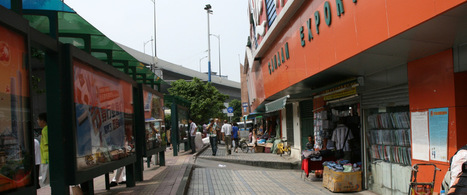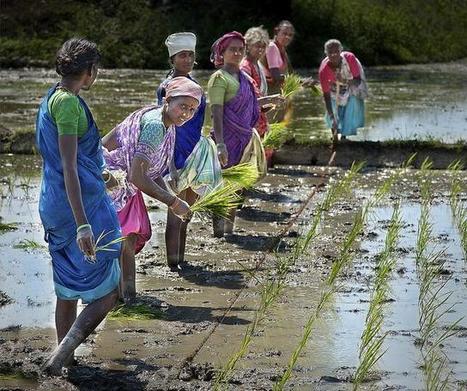This photograph is taken in Guangzhou (the city once known as Canton) at a wholesale clothing market. Most of the people in the market are not from Guangzhou. The market traders are a mix of people from China and from a number of different nations in Africa. The customers are primarily Africans. It is an international place, drawing all toward a common goal: to escape poverty through the international circulation of cell phones and clothing.
Most of those Africans in Guangzhou are working in businesses that facilitate the export of goods back to Africa. Gordon Matthews in his book Ghetto at the centre of the world tells us that Africans go through stages of engagement in the process of becoming a trader with China. The easiest point of access is via Hong Kong and in particular through a single building: Chung King Mansions. The traders come to Hong Kong with money that they have scraped together from friends and family seeking out those with experience. In Hong Kong, they will either buy from local wholesalers, which is a more expensive but potentially less risky option, and ship the good back or taken home as part of their luggage. Those who are more connected or willing to take bigger risks may find a guide who will take them to Shenzhen or, even better, Guangzhou to buy from wholesalers directly. Goods will then be shipped as in the photograph above or again carried home as luggage. Those who successfully manage the first trip, and are able to get their goods home, then survive economically to return again. Many do not.
Via
ddrrnt



 Your new post is loading...
Your new post is loading...










Africa is a very diverse and complicated continent due o mistakes made in the Berlin Conference. The strange boundaries drawn restrict these African nations to be one with their own people not with their enemies.
We have seen the repercussions of ethnic tensions play out in the Balkans, the Middle East, and even in the United States, and Africa is no exception. Arbitrarily drawn national borders- the remnants of European colonialism- means that there is often significant ethnic diversity within many African nations. Although this creates interesting blends of language and culture, it has often bred violence in many countries, perhaps most notably in South Africa and Rwanda. Although many members of the West like to lump the entire continent into a single category, this could not be further from the truth. The second largest continent with extreme biodiversity, it has bred thousands of languages and hundreds of different cultural backgrounds, sometimes within a single country. It is important for the West to understand the complex make-up of the African continent in order to avoid the Eurocentric assumptions many Westerners make when discussing the continent. There isn't a single "Africa"- there isn't even a single "Nigeria," but rather a multitude of different peoples and cultures, equally as complex as those found in other regions of the world. This map does a very good job at illustrating the complexity and richness of the continent.
People often underestimate how diverse Africa really is. We often have the tendency to lump all Africans together in one large ethnic group. The actual number of different ethnic groups in Africa is rather staggering. This map can also be used as a partial explanation for the amount of ethnic conflict in Africa. Often times, these ethnic groups are squashed together in states with poorly drawn borders. Under that situation, ethnic conflict becomes inevitable.